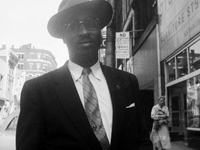The Senator John Heinz History Center is the largest history museum in the state of Pennsylvania, and covers 250 years of Pittsburgh's history. The center includes the Western Pennsylvania Sports Museum, which presents Pittsburgh's sports history. Seventy exhibits in the sports museum are interactive, and the site also makes extensive use of audio and visual presentations. The research center, which offers sources relevant to Western Pennsylvania history, holds more than 400,000 publications and 3,500 archival collections. A substantial amount of archival documents relate to Jewish life. The center also claims strong African American and Italian American holdings. The center is affiliated with the Meadowcroft Museum of Rural Life, which includes the oldest known site of human habitation within the entirety of North America. This museum is listed separately within the National History Education Clearinghouse database.
The center offers interactive and traditional exhibits, audiovisual presentations, a research center, research assistance, Scout programs, and a deli. Offerings specifically for schools include guided tours, self-guided tours, hands-on activities, classes, and educational programs. Students, teachers, and school staff members are admitted to the research center free of charge with a valid school ID. Wheelchairs are available for use on site. A sign language interpreter is available with advance notice. The website offers videos and audio files.
